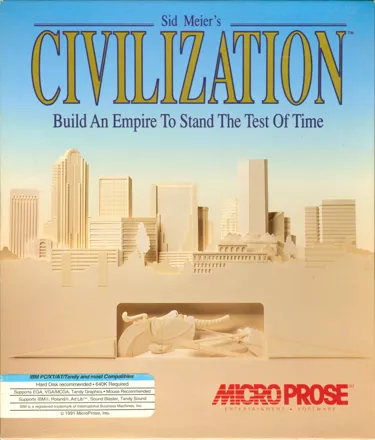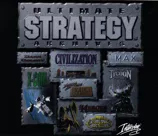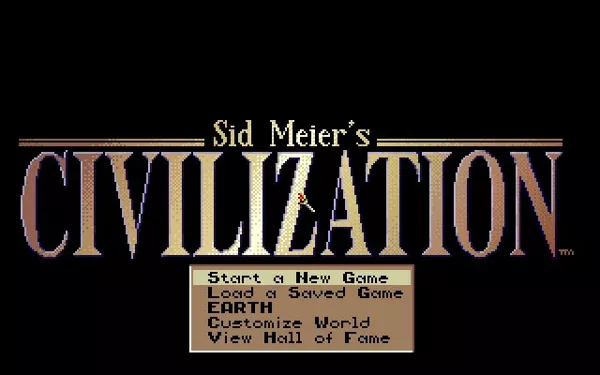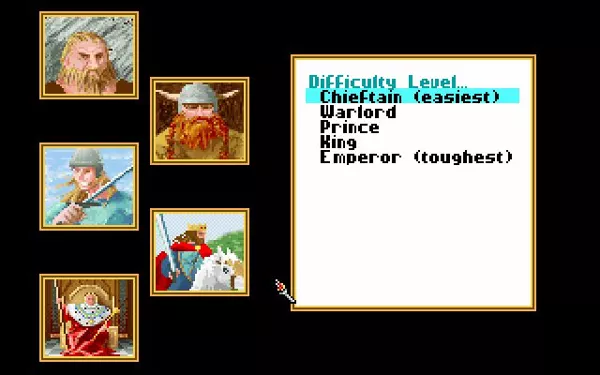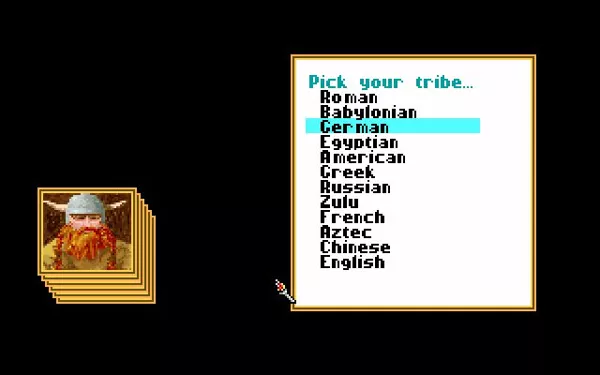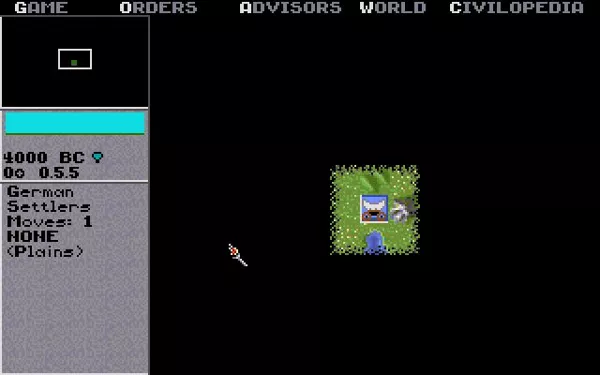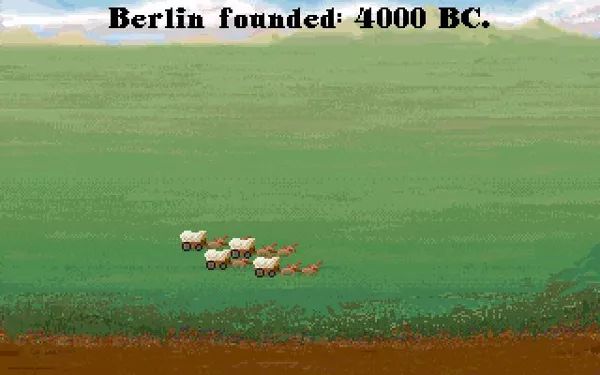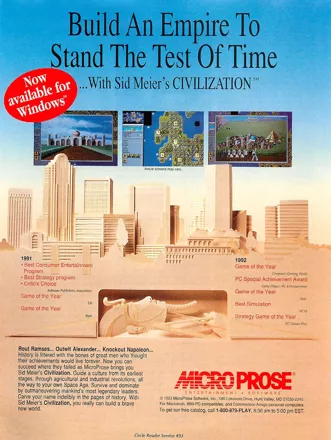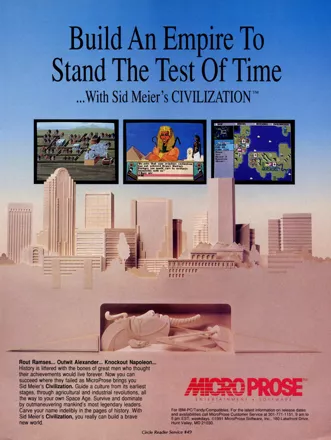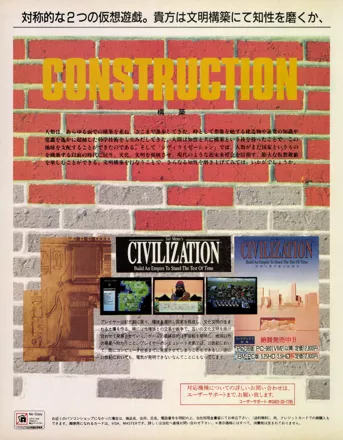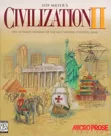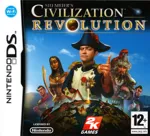Sid Meier's Civilization
Description official descriptions
Civilization has the widest scope of any strategy game of its time. You are a leader of a nation. You begin in the Stone Age, and complete the game in the XXIth century (unless your civilization gets destroyed earlier). Your eventual goal is to become the dominant civilization in the world, either by wiping out everybody else, or being the first to get a space ship to Alpha Centauri.
As the nation's leader, you have many responsibilities. You have to build cities, and then micromanage them, constructing various buildings. Most of people in your cities will be working on the neighbouring lands to get food (without it, your city won't survive or grow), production (used to build military units and buildings) and trade (which can be exchanged for money, science (see below) or luxuries that make people happy. You decide how much trade you want to invest into each of these areas.) You have to make sure that your people are in a good mood; if they get too unhappy, the city will collapse into disorder, and won't produce anything until you fix the situation.
If you're ambitious, you can build Wonders of the World - epic constructions, such as the Pyramids or the Hoover Dam. Each Wonder is an unique thing, and only one of each can exist in the world. They give you a lot of benefits if you complete them, but they take a long time to build, and many of them will eventually stop working.
There are other nations in the world, and there are also barbarians, so you'll have to invest into the military to protect yourself and to attack. Sure, you can sign peace treaties with other nations, and even exchange scientific knowledge with them (although sometimes they'll demand tribute from you), but eventually you'll probably have to fight. You control each of your military units on the world map, attacking your opponents' units and cities (possibly taking over them).
Not all units are for combat though. Settlers are used to build cities, create roads (for easier travel of your units) and improve the land around cities, increasing production. Diplomats can be sent to foreign cities to negotiate with the other nations or create embassies, but they can also bribe enemy units to join you and conduct espionage and sabotage in the enemies' cities. Caravans can be sent to faraway cities to increase trade in their home city, and they can also help in building Wonders of the World.
Scientific progress is an important part of the game. The more science your cities produce, the faster you research new technologies. Initially, you'll be finding out about the wonders of Alphabet or Bronze Working, but late in the game you'll be researching Computers and Robotics. Most technologies give you some new units, buildings and other things, although some have more interesting effects - for example, after inventing the Automobile, you'll find out that your citizens started producing pollution. Pollution is a bad thing; if there's too much of it, global warming may occur.
How your cities prosper depends partially on the type of government that your nation has. Initially you're living in Despotism, but this can stunt growth of your civilization, so it's a good idea to switch to something else - Monarchy, Republic, Democracy or Communism.
Spellings
- シヴィライゼーション 新・世界七大文明 - Japanese spelling
- 文明 - Simplified Chinese spelling
Groups +
- Game with creator's name
- Gameplay feature: Fog of war
- Games referenced in movies
- Games with classical music
- Games with game altering copy protection
- Games with manual lookup copy protection
- Games with randomly generated environments
- Powerplus releases
- Setting: Totality of history
- Sid Meier's Civilization series
- Sid Meier's licensees
- Sound engine: MED
- Theme: Famous politician
- Video games turned into board / card games
Screenshots
Promos
Credits (DOS version)
35 People · View all
| Game Design | |
| Original IBM Programming | |
| Original IBM Computer Graphics | |
| Original IBM Music Compositions | |
| Civilopedia | |
| Original IBM Sound Effects | |
| Tandy Sound Effects | |
| Documentation | |
| Editors | |
| Manual Design | |
| [ full credits ] | |
Reviews
Critics
Average score: 89% (based on 47 ratings)
Players
Average score: 3.9 out of 5 (based on 327 ratings with 12 reviews)
I can only say this The Civ line of games can never and will never be unseated from the Throne!
The Good
Everything
what more can you say.
The Bad
nothing
The Bottom Line
I have been giving reviews to my persoal favorites. This game is number 1.
DOS · by Shawn McDonie (13) · 2000
The best, strategy game of all time.
The Good
An incredible scope, and yet still great detail. This set the level of all games to come after it. I was playing the old game "Empire" before this. It was as big a jump as going from a black and white 10" screen (yes, I had one when I was a kid) to a 35" color HDTV today. This game was a bigger jump in innovation than any game before or since.
The Bad
It was actually a little buggy at the time. Of course it, probably strained that poor 286DX I had at the time. It used to crash quite often, but I would still immediately reboot and continue playing.
The Bottom Line
This is the classic conquer the world game. Start as nomad wondering the plains and advance over the next 6000 years to send a mission to the nearest star. Be warned this game is incredibly addictive.
DOS · by Jeff Watts (18) · 2001
The first game where AI had a meaning
The Good
Civilization was the first strategy game I ever played on a PC,and the third true game ,after Prehistorik and Chessmaster
Since I was creamed at chess due to the recursive backtracking procedure that computer used to prove it's faster than a human mind,I expected the same in this square-by-square game,but...there were to many for backtracking
So the rat-mind computer employed massive cheating:population boost,building things out of thin air,map knowledge,etc,instead of: "Gee,what happens if I send my lonely knight into thy army?"
But that added to the challenge (since I barely noticed that until my first spaceship got launched) which was based ,mainly ,on discovery of technologies,meeting leaders who had a different look each time they changed their government, advisers and senate who influenced your decisions and even blocked your desire for expansion in democracy and ancient republic
(So you could not bomb and invade everyone in a democracy:)
Unfortunately the later sequels of this great game (who also employs a good manual,at least from historic point of view) have lost many of its advantages:
The democratic rulers became mere communists and the democracy itself became just a prosperous dictatorship ,with less wars.The other leaders faces were hidden and only the diplomatic sense remained out of the personal feeling that I loved so much.Also ,when you are talking to a republic,no longer the minister of foreign affairs appear ,with he's glasses jumping at each one of your offensive proposals,no longer you talk to many in a democracy,but just with the old Stalin:(
The advances are realistically related and the pace of discovery increases,instead of decreasing ,as with all sequels
The Bad
The graphics are simply bad,even for that time,the pieces are just..that,2-D chess-like.
The settlers unit is working to hard to build roads ,essential to your commerce,and everything else that matters and unit maintenance is too high
The piece by piece movement is boring and time consuming,there are no armies
Also,it's to often when you''l find your Apache being shot down by a mounted Afghani with a Stinger missile-launcher in his hands or your Leopard tank being ravaged by slingers
There's too much cheating by the computer
The Bottom Line
That's the game I searched for 10 years ,I wanted to have it for it's the single most-important road-opener to global strategy gender
Now I'm playing it with the same sense of humor,not with the same passion and it's faults appear more disturbing to me
But,as the intelligence quantity is a constant and the size and time constraints of all strategy games are increasing,it's one of the very few smart games still available .In a very short time,you can learn a lot about balance ,focus and planning-ahead.
So go get it!
DOS · by lucian (36) · 2005
Trivia
1001 Video Games
The PC version of Civilization appears in the book 1001 Video Games You Must Play Before You Die by General Editor Tony Mott.
Avalon Hill
The game was partially inspired by the Avalon Hill boardgame Civilization and later Advanced Civilization. When Sid Meier's version became so popular, Avalon Hill actually came out with Advanced Civilization for the PC. Avalon Hill then sued Hasbro/MicroProse for copyright infringement. Activision got involved as they want to license the Avalon Hill version for their Civilization: Call to Power. MicroProse then went on, with Hasbro's help, to buy out the original inventors of the Avalon Hill's version, thus negating the suit. Finally they settled out of court. Activision gets the license to make Call to Power, MicroProse keeps the computer game name Civilization, and Avalon Hill gets nothing.
Board game
Coming full circle from its apocryphal roots in the 1980 Hartland Trefoil / Avalon Hill boardgame Civilization, 2002 saw the release of Sid Meier's Civilization: the Boardgame.
Development
Dan Bunten, creator of the M.U.L.E., wanted to follow this game up with a computer port of the Avalon Hill board game Civilization. Unable to drum up enough support from his Ozark colleagues, he instead went on to create Seven Cities of Gold. After leaving Electronic Arts in 1988, Bunten signs a deal with Microprose and has a choice between the Civilization port and a conversion of Milton Bradley's Axis and Allies. Fellow Microprosian Sid Meier convinces him to tackle the latter, which becomes Bunten's Command H.Q.. Meier, of course, goes on to make Civ.
Gandhi and nukes
A long-standing urban legend claimed that the Indian civilization's leader Mahatma Gandhi was especially prone to using nuclear weapons due to a game bug. In the game, each leader has their own statistics that define their personality towards others. According to the legend, once a player researches and adopts democracy in the game, all leaders would have their aggression stat towards the newly-democratic player reduced by 2. However, India's leader Mahatma Gandhi already had that stat set to 1 by default, and the effect of democracy caused an integer overflow - it would have theoretically gone to -1, but the stat apparently used an unsigned 8-bit integer format for its value, setting Gandhi's aggression to 255 and having him threaten players with nuclear weapons. The story first appeared on the TV Tropes wiki in 2012, spreading from there until it was widely reported by gaming media. However, in his 2020 autobiography Sid Meier's Memoir!, designer and programmer Sid Meier debunked the story, stating that such a bug never existed since government types do not affect the AI leaders' aggressiveness rating. And even if they did, the C dialect used to program Civilization used signed integers as a default, meaning no overflow would happen. The supposed bug became a running joke among the fans and the "Gandhi using nukes" meme made an appearance in the Civilization series itself: Gandhi's nuke production and usage stats in Sid Meier's Civilization V are always set to the maximum value, and in Sid Meier's Civilization VI, Gandhi has an increased chance of having the "Nuke Happy" hidden agenda. Since Civilization V was released before the first claim of the supposed bug, it was not influenced by the legend, possibly influencing it instead.
Further reading: Nuclear Gandhi at Wikipedia.
Inspiration
Although clearly inspired in part by Avalon Hill's Civilization boardgame, Sid Meier's Civilization also draws very heavily upon the original conquer-the-world computer strategy game Empire: Wargame of the Century.
Intro
The lines of text shown in the intro cinematic/animation are read from a plain text file in the game's directory, and thus can be easily modified.
References to the game
Strangely enough, but in Sliver, a thriller movie with Sharon Stone, William Baldwin and Tom Berenger, you can spot a poster on the wall to secret room of the bad guy in the movie, a close up of the front cover of Sid Meier's Civilization game. It is hardly noticeable as it appears for a split second.
Soundtrack
An orchestral version of the game soundtrack was released on the CD-ROM (as audio tracks) of Sid Meier's CivNet in 1995.
Strategy guide
Sid Meier's Civilization was one of the first games to have a paperback strategy guide released for it: Alan Emrich and Johnny Wilson's Rome on 640K a Day.
Awards
- Amiga Joker
- Issue 02/1993 – #3 Best Game of 1992 (Readers' Vote)
- Issue 02/1993 – Best Simulation of 1992 (Readers' Vote)
- Computer Gaming World
- November 1992 (Issue #100) – Overall Game of the Year
- August 1993 (Issue #109) - Introduced into the Hall of Fame
- November 1996 (15th anniversary issue) - #1 overall in the “150 Best Games of All Time” list
- March 2001 (Issue #200) - #1 in the "Top Ten Games of All Time" list (Editors' vote)
- March 2001 (Issue #200) - #7 in the "Top Ten Games of All Time" list (Readers' vote)
- Game Informer
- August 2001 (Issue 100) - #62 in the "Top 100 Games of All Time" poll
- GameSpy
- 2001 – #4 Top Game of All Time
- GameStar (Germany)
- Issue 12/1999 - #1 in the "100 Most Important PC Games of the Nineties" ranking
- PC Gamer
- April 2000 - #11 overall in the "All-Time Top 50 Games" poll (the oldest game to make the list)
- Retro Gamer
- October 2004 (Issue #9) – #29 Best Game Of All Time (Readers' Vote)
- The Strong National Museum of Play
- 2022 – Introduced into the World Video Game Hall of Fame
Information also contributed by Adam Baratz, Andrew Grassender, JimmyA, Kasey Chang, lethal guitar, MAT, PCGamer77 and Pseudo_Intellectual
Analytics
Related Sites +
-
Apolyton Civilization Site
Comprehensive site about the whole Civilization series -
Civilization Fanatics Center
A great site devoted to the Civilization Series. Includes strategies, chat board, downloads and more. -
IGCD Internet Game Cars Database
Game page on IGCD, a database that tries to archive vehicles found in video games.
Identifiers +
Contribute
Are you familiar with this game? Help document and preserve this entry in video game history! If your contribution is approved, you will earn points and be credited as a contributor.
Contributors to this Entry
Game added by MajorDad.
Windows 3.x, SNES added by PCGamer77. Amiga added by Rebound Boy. Atari ST added by Martin Smith. PlayStation added by qwertyuiop. Macintosh added by Игги Друге. PC-98 added by Unicorn Lynx. SEGA Saturn added by Thiago Simões.
Additional contributors: Ummagumma, Terok Nor, MAT, Robert Teichmann, PCGamer77, Unicorn Lynx, Jeanne, Alaka, monkeyislandgirl, formercontrib, Patrick Bregger, Plok, Victor Vance, FatherJack, SoMuchChaotix.
Game added December 21st, 1999. Last modified January 19th, 2024.
